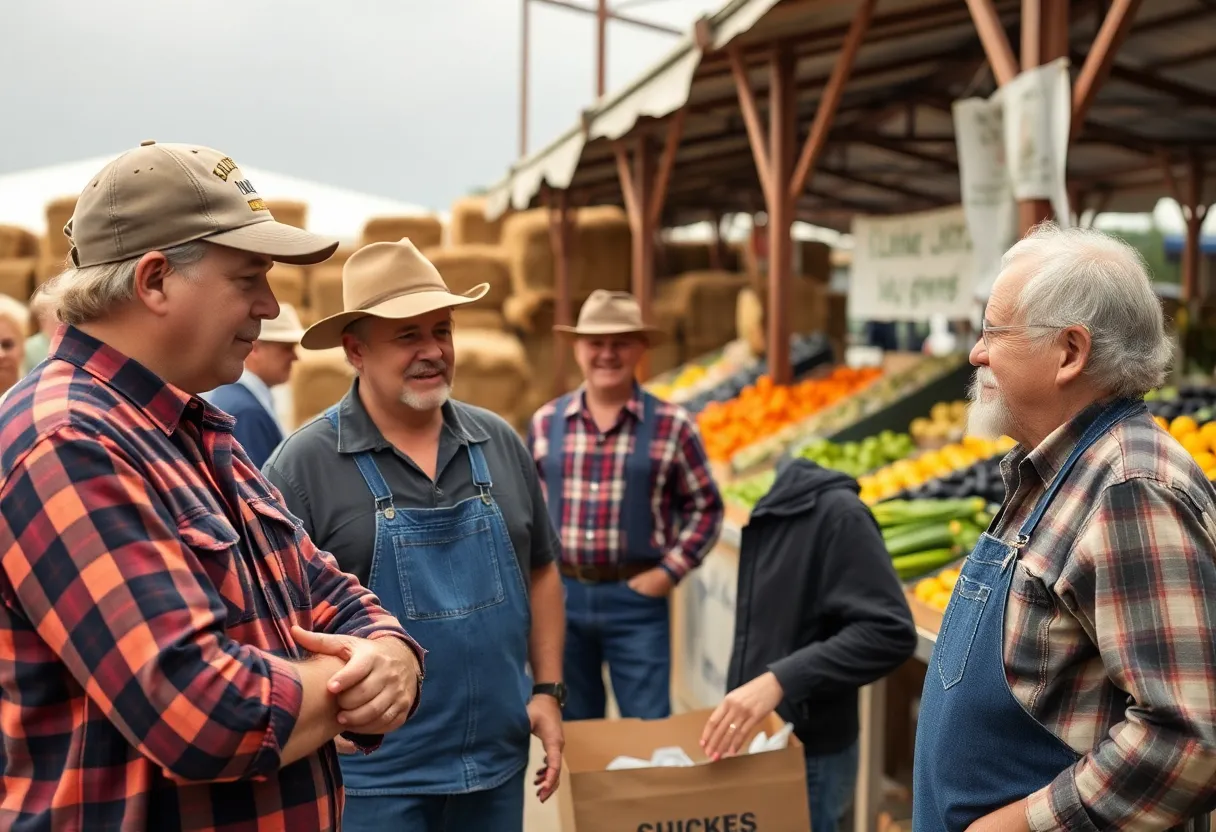

Tennessee Farmers Market Amid Tariff Concerns
Tennessee’s farmers and businesses are bracing for an estimated $8 billion in losses due to new tariffs imposed by President Trump. During a town hall meeting at Ole Smoky Distillery, local leaders expressed concerns about the significant financial burden these tariffs will impose. The agricultural sector, especially, is at risk as tariffs on imports from Mexico, Canada, and China loom. With job security and market stability in jeopardy, community awareness and collective response have never been more critical.
In the heart of Nashville, Tennessee farmers and local business owners are feeling the heat as new tariffs introduced by President Trump threaten to hit the state with a staggering $8 billion in potential losses. As various sectors in the state brace for the consequences, the community gathered at a town hall meeting held at Ole Smoky Distillery to voice concerns and seek clarity on the tariffs’ impact.
During the meeting, a panel of experts highlighted the financial burden that these tariffs could impose on the already struggling economy. Dr. Steven Livingston, a professor with a focus on Political Science and International Relations at MTSU, shared insights regarding the significant implications for Tennessee’s agricultural and business sectors. With the implementation of a 25% tax on imports from Mexico and Canada, coupled with a 20% tariff on Chinese goods, the stakes are indeed rising.
Although some tariffs on Mexico have been postponed for a month following recent discussions with the Mexican president, the overall sentiment remains one of uncertainty. J. Robert Hall, CEO of Ole Smoky Distillery, reported that sales to Canada have essentially “evaporated” due to these trade restrictions, affecting local businesses deeply.
With the looming deadline of April 2nd, many farmers and business owners are on high alert, preparing for what they anticipate to be a difficult period. The Farmers for Free Trade group predicts that Tennessee could be staring down the barrel of over $8 billion in tariffs. To put things in perspective, last year’s tariffs on Mexican imports alone already resulted in a $3.7 billion tax increase for the state. Given that Mexico is Tennessee’s largest market for corn and pork exports, the ripple effect of these tariffs could be catastrophic.
The situation with China is equally daunting, with 12% of Tennessee’s imports in 2024 originally sourced there. The new tariffs could add up to a potential $2.6 billion cost for Tennesseans. Canada, being the seventh-largest source of imports for the state, could also face an annual increase of $1.4 billion due to tariffs.
Panelists discussing these issues outlined the troubling impact on prices for basic goods such as corn, wheat, lumber, and steel. Brian Kuehl, representing Farmers for Free Trade, stressed the critical worries surrounding planning and market unpredictability. As expensive feed and fertilizer cost climb, profit margins for local hog farmers are shrinking.
One farmer expressed that in his neighborhood alone, at least four farmers have had to sell off their operations this year, a clear sign of the impending crisis. The potential impacts of these tariffs could shift the agricultural sector from a mere recession into a full-blown depression.
As Tennessee’s total imports in 2024 were valued at $111 billion, with Canada, Mexico, and China making up nearly a third of that figure, it is safe to say that the ripple effects of these tariffs extend beyond just the agricultural sector. Industries such as whiskey production, baked goods, and automotive manufacturing are on the line as the threat of retaliatory tariffs looms large.
With rising prices due to tariffs, job security is also being threatened, particularly in the hospitality and retail sectors where estimates suggest that tens of thousands of jobs may be at risk. For context, Tennessee faced only a $2.6 billion total in tariffs on all imports in 2024, but the upcoming changes could propel that number to new heights, placing Tennessee among the states most affected by these new tariff measures.
In light of these developments, Farmers for Free Trade is diligently working to raise awareness about the looming challenges and their effects on not just businesses but also consumers throughout Tennessee. The need for a collective community response has never been more critical as everyone prepares for what lies ahead.
News Summary The Pigeon River has reopened for whitewater rafting, much to the relief of…
News Summary CoreCivic, a private prison operator, has filed a $500 million lawsuit against Universal…
News Summary After a particularly wet month of May with nearly 9 inches of rain,…
News Summary The Memphis Italian Festival is back for its 35th installment, offering a weekend…
News Summary Memphis rap is rising to prominence with local artists collaborating with mainstream acts.…